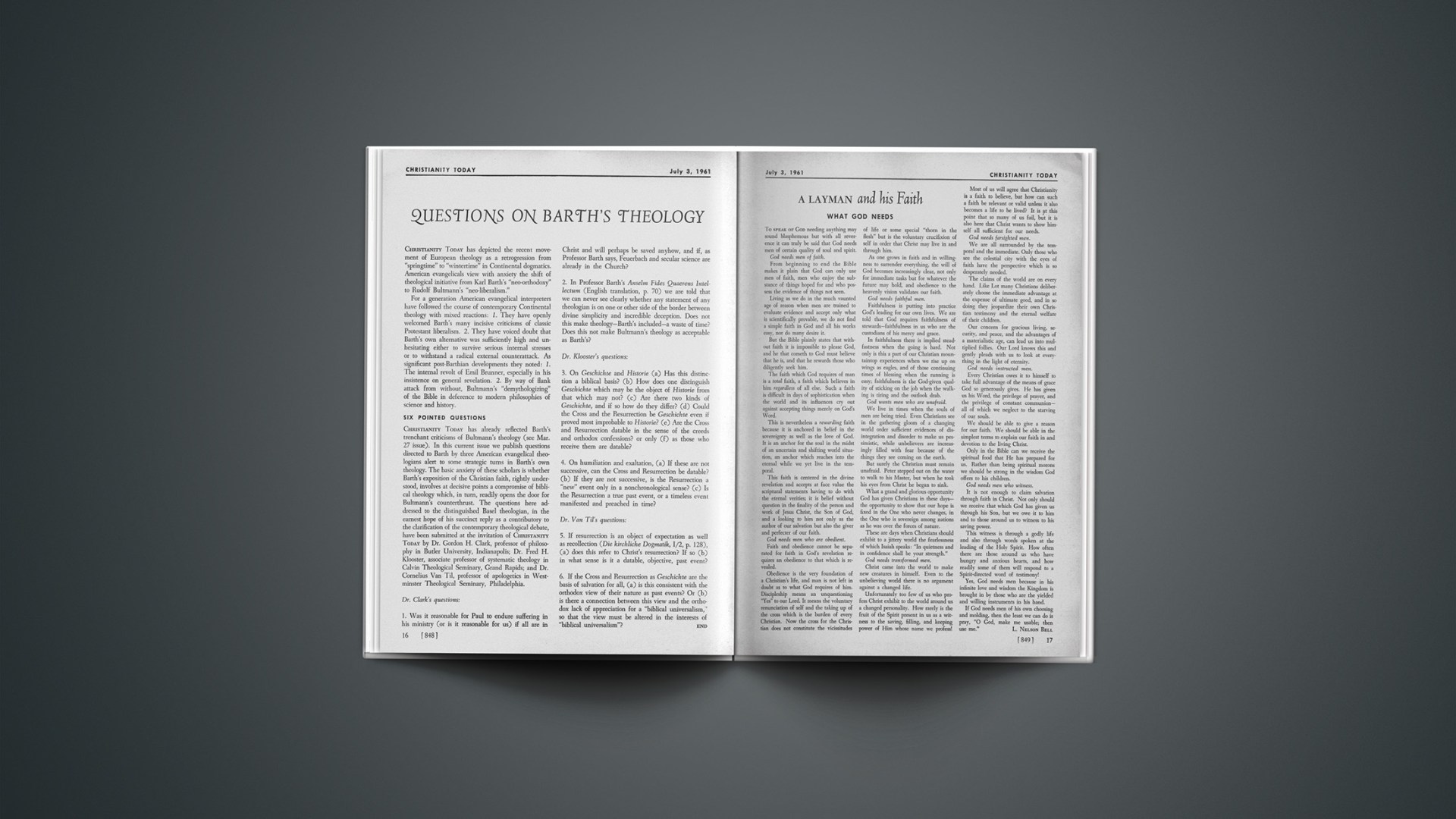Christianity Today has depicted the recent movement of European theology as a retrogression from “springtime” to “wintertime” in Continental dogmatics. American evangelicals view with anxiety the shift of theological initiative from Karl Barth’s “neo-orthodoxy” to Rudolf Bultmann’s “neo-liberalism.”
For a generation American evangelical interpreters have followed the course of contemporary Continental theology with mixed reactions: 1. They have openly welcomed Barth’s many incisive criticisms of classic Protestant liberalism. 2. They have voiced doubt that Barth’s own alternative was sufficiently high and unhesitating either to survive serious internal stresses or to withstand a radical external counterattack. As significant post-Barthian developments they noted: 1. The internal revolt of Emil Brunner, especially in his insistence on general revelation. 2. By way of flank attack from without, Bultmann’s “demythologizing” of the Bible in deference to modern philosophies of science and history.
SIX POINTED QUESTIONS
CHRISTIANITY TODAY has already reflected Barth’s trenchant criticisms of Bultmann’s theology (see Mar. 27 issue). In this current issue we publish questions directed to Barth by three American evangelical theologians alert to some strategic turns in Barth’s own theology. The basic anxiety of these scholars is whether Barth’s exposition of the Christian faith, rightly understood, involves at decisive points a compromise of biblical theology which, in turn, readily opens the door for Bultmann’s counterthrust. The questions here addressed to the distinguished Basel theologian, in the earnest hope of his succinct reply as a contributory to the clarification of the contemporary theological debate, have been submitted at the invitation of CHRISTANITY TODAY by Dr. Gordon H. Clark, professor of philosophy in Butler University, Indianapolis; Dr. Fred H. Klooster, associate professor of systematic theology in Calvin Theological Seminary, Grand Rapids; and Dr. Cornelius Van Til, professor of apologetics in Westminster Theological Seminary, Philadelphia.
Dr. Clark’s questions:
1. Was it reasonable for Paul to endure suffering in his ministry (or is it reasonable for us) if all are in Christ and will perhaps be saved anyhow, and if, as Professor Barth says, Feuerbach and secular science are already in the Church?
2. In Professor Barth’s Anselm Fides Quaerens Intellectum (English translation, p. 70) we are told that we can never see clearly whether any statement of any theologian is on one or other side of the border between divine simplicity and incredible deception. Does not this make theology—Barth’s included—a waste of time? Does this not make Bultmann’s theology as acceptable as Barth’s?
Dr. Klooster’s questions:
3. On Geschichte and Historie (a) Has this distinction a biblical basis? (b) How does one distinguish Geschichte which may be the object of Historie from that which may not? (c) Are there two kinds of Geschichte, and if so how do they differ? (d) Could the Cross and the Resurrection be Geschichte even if proved most improbable to Historie? (e) Are the Cross and Resurrection datable in the sense of the creeds and orthodox confessions? or only (f) as those who receive them are datable?
4. On humiliation and exaltation, (a) If these are not successive, can the Cross and Resurrection be datable? (b) If they are not successive, is the Resurrection a “new” event only in a nonchronological sense? (c) Is the Resurrection a true past event, or a timeless event manifested and preached in time?
Dr. Van Til’s questions:
5. If resurrection is an object of expectation as well as recollection (Die kirchliche Dogmatik, I/2, p. 128), (a) does this refer to Christ’s resurrection? If so (b) in what sense is it a datable, objective, past event?
6. If the Cross and Resurrection as Geschichte are the basis of salvation for all, (a) is this consistent with the orthodox view of their nature as past events? Or (b) is there a connection between this view and the orthodox lack of appreciation for a “biblical universalism, so that the view must be altered in the interests of “biblical universalism”?









